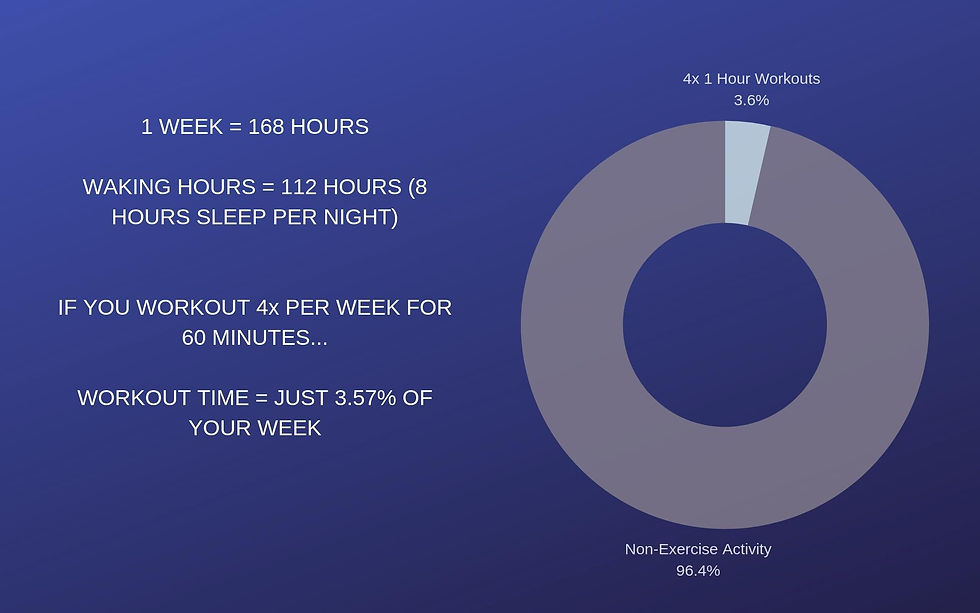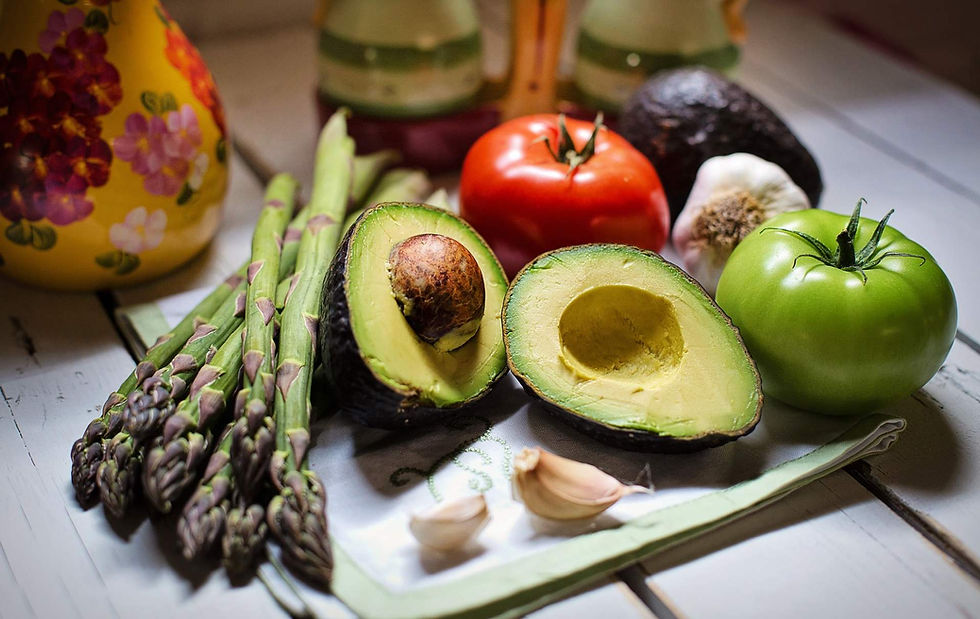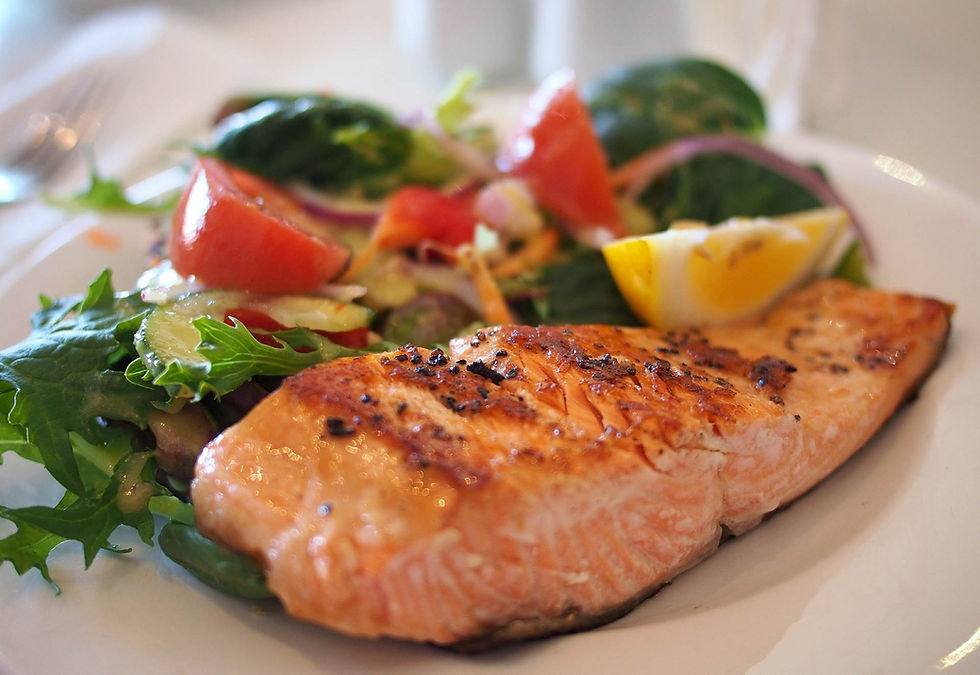8 Ways To Increase Your Metabolism & Burn More Fat
- Chris Browning

- May 3, 2019
- 8 min read
Updated: Nov 24, 2019
Increased metabolic rate = more calories burned = less body fat...
Metabolic rate, describes the total amount of energy required to perform ALL of the chemical reactions in your body on a daily basis.
You can influence your metabolism through a variety of lifestyle choices. And as a result, you can burn fat at a faster rate, making it easier to achieve the body you want.
Therefore, increasing the body's metabolic rate becomes a top priority for many clients who are looking to reduce body fat.
This is logical, as boosting the rate at which your body naturally burns stored fat can make life seem a lot easier (compared to trying to burn as many calories as possible during individual workouts or dramatically cutting calories out of your diet).
Boosting your metabolism can be thought of as a bio-hack; compounding the result of your efforts in the gym and potentially reducing the need to give up your favourite foods. As such... suggested methods to increase metabolism (including useless/potentially harmful supplements) are widespread....
Here are the most effective and practical ways to increase your metabolism, using the methods I use with my own clients.
1. Build Muscle

Muscle is "metabolically expensive". Creating it, and keeping it, requires (a lot of) energy. (Which is also why our bodies evolved to get rid of any muscle that isn't being used - "use it or lose it"). Particularly when you are resting (anytime you're not working out) much of the energy required by your muscle, comes from burning your stored body fat.
So simply put, the more muscle you have, the greater the amount of fat your body will need to burn to keep it. With less muscle, you have a lesser need to burn that energy... and it's more likely that energy from food will be stored (as fat).
Note: Building/maintaining muscle IS NOT "bodybuilding" or "bulking". This is not about getting "big". With the correct approach to training and nutrition, gaining muscle will produce a lean and "toned" body. (If you're rapidly getting bigger, sadly this more likely to be fat gain - you are unlikely to be getting noticeably bulky due to overnight muscle gains).
2. Train at High Intensity

'High intensity' training simply refers to any type of exercise that you would not be able to maintain for more than approximately 60 seconds.
(The important thing to remember is that you CAN NOT maintain high intensity. If you are CHOOSING to stop/slow down because you're slightly warm, a little out of breath or just because your watch/app tells you to... you are probably not at high intensity).
Example: If you are on the treadmill for 30 minutes, jogging at a steady pace of 10km/hr, you are not training at high intensity. You are working at a level that you can physically manage, without needing to rest during the workout.
(That is NOT to say that jogging is not an effective training method - it just produces different results to High Intensity Training)...
Compare that to spending 15 minutes on the treadmill; alternating between a speed of 15km/hr for 30 seconds, and then walking at 4.0km/hr, for 90 seconds to recover. The 30 seconds sprint is enough to force you to slow down, and after a (necessary) opportunity to recover, you are able to repeat. This is just one example of training at high intensity. The level of work that you are performing here can be replicated via a wide variety of exercises.
Studies have shown that training in such a way has a direct, positive effect on your metabolism. This is what is sometimes referrred to as the after-burn effect; your metabolic rate will rise, and remain elevated, for anywhere between 24-48 hours post-exercise.....
Repeat 2-3 times per week, and you have effectively achieved a permanent increase in your metabolic rate.
The only "catch", is that training at high intensity is physically demanding. If you are not used to it, integrate this type of training into your routine slowly. And focus on a high quality sessions versus high quantity. A 15 minute sprint interval session, done correctly, will generally outweigh a 30 minute session at slower speeds (from a metabolism point of view at least).
3. Eat Enough Protein

When you are training to build muscle ie. weight training, your protein requirements are increased.
During your workouts, you are placing a stress on your muscles. This stress is the stimulus for muscle growth. IF you then allow adequate rest and provide them with the correct nutrients, that muscle repair/growth process can take place.
This is where an adequate protein intake is vital. Without a supply of proteins, broken down in to amino acids, your muscles simply don't have the building blocks available to repair and grow.
Again, less muscle = less fat burning.
4. Move!

Are you a physically active person?
Think about your whole day. Not just the amount of time you spend deliberately exercising.
Even if you are training regularly, you have a very significant amount of time left over, where, if you are anything like the average person, you may be doing very little in terms of physical activity.
Modern living simply doesn't provide the spontaneous movement that our bodies are designed to be doing....
Driving or taking the train to work
Sitting for hours at your desk
Spending evenings sitting in front of the TV
These are all very typical habits. And they do make up the majority of most people's days. Even for those who think they are generally very active.

Make the most of this huge opportunity for calorie burning by making every effort to adopt the following...
Walking/cycling instead of driving; track your steps using wearables or your phone and aim for a minimum of 10,000 steps every day
take the stairs instead of the elevator wherever realistically possible. There are not many valid excuses for not climbing 1-2 floors on the stairs. Yes it's a cliche. But it's effective!
use a standing desk. Simply standing instead of sitting will force you to engage significantly more muscle throughout the body, increasing the energy required. Plus you will be likely to fidget more which will also be major increase in activity compared to sitting comfortably
Use your break/lunch to get outside and move. Walk to the nearest cafe/shop instead of using the staff break room. (It's too easy to tell yourself that you've been working hard and deserve a rest during your tea-break. But the average UK worker is said to actually only manage 3 hours of work in an 8 hour work day..... So there goes your excuse for sitting down and taking a "well earned rest").
5. Sleep More

We are a sleep deprived society. An average night of sleep in the UK is approx 6.5 hours (compared to approx 9 hours 100 years ago). Both sleep quantity and quality have a huge influence on a variety of hormonal and metabolic processes throughout the body.
If you are sleeping for less than the recommended amount (7-9 hours) you are causing your body to respond negatively, in a variety of ways.
After just a few nights of bad sleep:
your body is more likely to store energy from food as fat, because your ability to absorb glucose into your muscles is reduced
simply feeling tired will give you an easy excuse to do less exercise, and take easy travel options such as driving short distances rather than walk
hormonal changes in your body will negatively affect your appetite. You will feel more hungry and be significantly more likely crave "bad" foods and neglect more nutritious options.
Suffering from a lack of sleep has both direct, and indirect consequences for your metabolic rate and is potentially a major driver of the increasing levels of global obesity.
Sleeping more is free of charge, requires little effort and has a massive positive effect on general health. For many clients working on lifestyle change, this is one of the first points of action as there are simply no downsides.
6. Make Sure You Are Getting Your RDA of Vitamins & Minerals

PTs and other "influencers" often suggest that you you can eat what ever you like "as long as it fits your macros".
What they mean, is that if you eat the 'correct' amount of protein, carbohydrate and fat every day, you can be largely confident that you are on the path to positive results (assuming that you are training correctly of course).
Meeting macronutrient targets is important. But the bigger picture includes MICRO-NUTRIENTS too.
To function optimally (including a healthy metabolism), you need to ensure that you are eating an adequate level of a whole range of vitamins and minerals.
Missing your RDA of Calcium, the B Vitamins or Iron (among many, many others) for example will mean that your body simply does not have the tools it requires to perform the various processes involved in a healthy metabolism.
Eating a wider variety of fruit and vegetables is generally a good idea and will help top up levels of a lot of these nutrients in your diet. But many others can be found in foods that have become fashionable to avoid. Some meat and dairy products are a good source of some important nutrients... Worth remembering if you have decided to adopt a vegan diet for health reasons.
(Make an appointment with a Registered Dietitian if you think you need to look at your personal nutrition in more detail).
7. Avoid Restrictive Diets

I could write pages and pages about the potential problems of fad diets and the apparent popularity of cutting out different food groups. The point for this post, is that making drastic cuts to your existing diet, without due care, may cause more harm to your metabolism, than good....
Workout Intensity: It is extremely popular to label "carbs" as the enemy in a weight loss programme. This is wrong (full details on another day). From a metabolism perspective, youv'e seen earlier in this post how important it is to train with weights, and at a high intensity. The fuel that your body depends on during those types of workouts.... is carbohydrate. Starve your body of carbs, and that fuel isn't there.
(Yes you can burn fat for energy but it's not always that simple. Again, the details of that will be saved for another post).
So without an efficient fuel source.... guess what? Your workout intensity drops. You've just lost your best chance of achieving muscle gains and a workout "afterburn".
So think again if you assumed that you are improving your ability to burn fat by cutting carbs.
Energy Preservation: The human body is mind-bogglingly complicated. It has evolved over millions of years, driven mainly by threats to our wellbeing and survival.
Although hard to imagine now, for most of our existence there was not a constant supply of calorie dense food. We had to hunt and forage for every meal. So not surprisingly, our bodies evolved mechanisms to keep us alive during times where food may have been hard to come by.
The human body has adapted to hunger, by slowing down non-essential metabolic processes. In other words, during times of prolonged food restriction, your metabolism has evolved to slow down in an attempt to keep you alive.
This is the risk that you take when making dramatic reductions to your food intake... if you're calorie restriction is too extreme... your metabolism may slow down to counter the 'threat'. While you strictly could still lose fat in this scenario... it is definitely not the most enjoyable, safest or most efficient way to do so.
Nutrient Deficiency: The harsh truth is; if you have an unhealthy diet, simply reducing the amount of food that you eat, or removing a food group, is probably not the answer.
You might already be deficient in vital vitamins and minerals*, which as you saw earlier, are key to the maintenance of a healthy metabolism. So by simply reducing the quantity of bad foods that you eat, you are not going to be improving the quality of your diet.
*See a qualified professional to clarify whether you do have any nutritional deficiencies.
Also, many of those vitamins and minerals are fat soluble. This means that they are transported around your body within fat. If you've removed dietary fat based on a (incorrect) belief that this will reduce your fat storage, then you risk further reducing the availability of any of these nutrients (even if you were eating enough of them in the first place).
8. Hydration

Most of the methods on this list are aimed at making the most of chemical reactions that happen in the body.
Most (probably all) of those chemical reactions require water.
If you're dehydrated, you risk down regulating those processes.
In other words, your body will not metabolise energy correctly if you are not drining enough water.
Note: Remember alcohol and caffeine are diuretic (cause excess water loss).






Comments